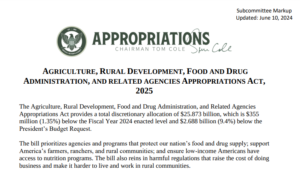House Agriculture Chair G.T. Thompson has tentatively scheduled a farm bill markup for the week of Feb. 23, according to three people familiar with the plans.
House Subcommittee Approves Ag Funding Bill
E&E News’ Marc Heller reported earlier this week that “House appropriators Tuesday approved their annual agriculture spending bill for fiscal 2025 that would cut programs related to climate change and rural energy.”
“Agriculture Appropriations Subcommittee Chair Andy Harris (R-Md.) said the $25.9 billion measure would rein in wasteful spending on Biden administration priorities while maintaining core programs across the Department of Agriculture,” Heller reported. “‘We’re not appropriating ‘Monopoly’ money,’ Harris said at Tuesday’s markup, where the measure passed on a voice vote. There were no amendments, leaving that possibility for the full (Appropriations) committee.”
Bloomberg Law’s Skye Witley, Alex Ruoff and Nyah Phengsitthy reported that “the Agriculture-FDA funding proposal published Monday would allocate $25.9 billion in discretionary spending in fiscal 2025, $355 million less than the $26.2 billion allocated in the current year, according to a GOP summary of the measure.”

What’s In the Bill?
“Harris’ bill would cut the climate hubs program at the USDA, reduce certain agricultural research and fund the Rural Energy for America Program — which helps farmers install more efficient energy systems — at 90 percent below the Biden administration’s budget request,” Heller reported. “Like last year’s failed proposal, the bill approved Tuesday would eliminate urban agriculture programs and also cut off the USDA’s moves on diversity, equity and inclusion.”
“The Natural Resources Conservation Service, which runs many conservation and climate-oriented programs, would see an $11.9 million cut, to a total of $903 million,” Heller reported. “Harris proposed an increase for meat and poultry inspections at the Food Safety and Inspection Service.”
Hoosier Ag Today’s Eric Pfeiffer reported that “the GOP bill would boost both SNAP and WIC, but only to account for inflation and allow states into a SNAP voluntary pilot to restrict unhealthy food choices. And the bill rejects any new program funding, taking aim at the bureaucracy as Harris did for FY 2024.”
“The FY 2025 proposal boosts funding for … meat and poultry inspectors, emerging pest control, and the ReConnect broadband program,” Pfeiffer reported. “It also improves tracking of foreign ownership of U.S. farmland and directs NASS to reinstate its July cattle and county crop reports.”
Brownfield Ag News’ Nicole Heslip reported, however, that the Subcommittee’s Ranking Member, Sanford Bishop, said that “‘I’m afraid that this bill will prevent the agency from reinstating these important surveys that our producers rely on.'”
Better Chance to Pass this Year?
The Hill’s Aris Folley reported that “House Republicans noticeably forgo language limiting access to the abortion pill mifepristone in their newly unveiled agricultural funding bill, after a similar effort last year helped doom their 2024 plan while exposing intraparty divides on the issue.”
“Its absence comes after GOP leaders struggled to pass the previous bill amid opposition from moderates, and as abortion is still top of mind for some voters months out from the critical November elections,” Folley reported.
Despite not including language limiting access to mifepristone, the bill’s future is still uncertain.
“While the bill doesn’t go as far in cutting as the initial bill for fiscal 2024, its prospects beyond the Appropriations Committee are unclear,” Heller reported. “The top Democrat on the full Appropriations Committee, Rep. Rosa DeLauro of Connecticut, said the Republican majority is ‘dragging us down a path of chaos’ on annual spending bills that have no chance of becoming law.”





